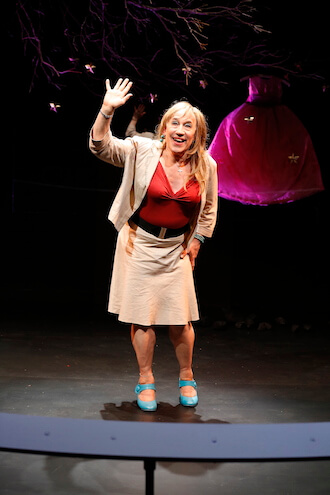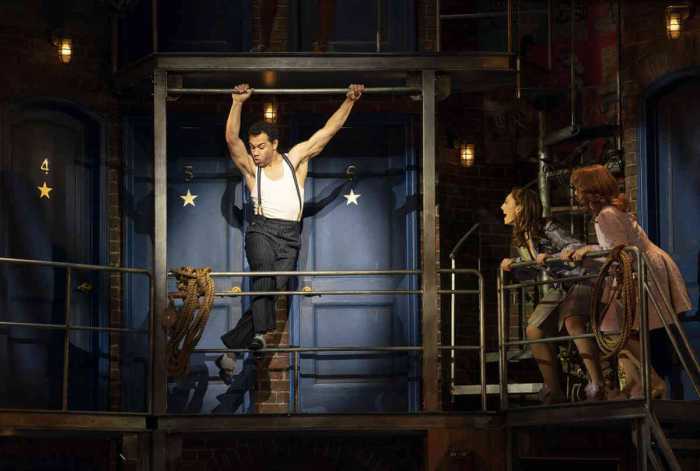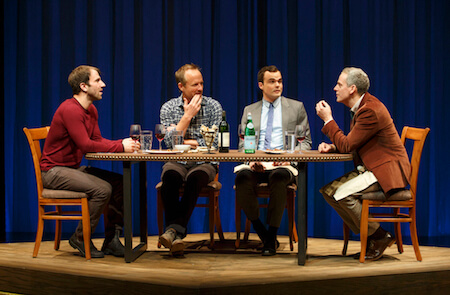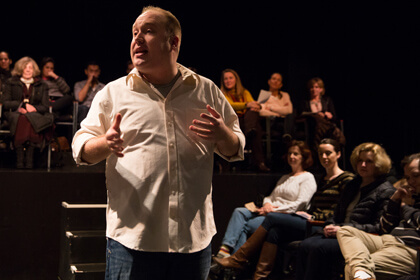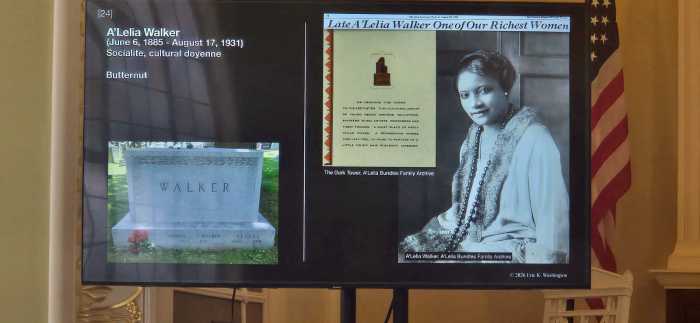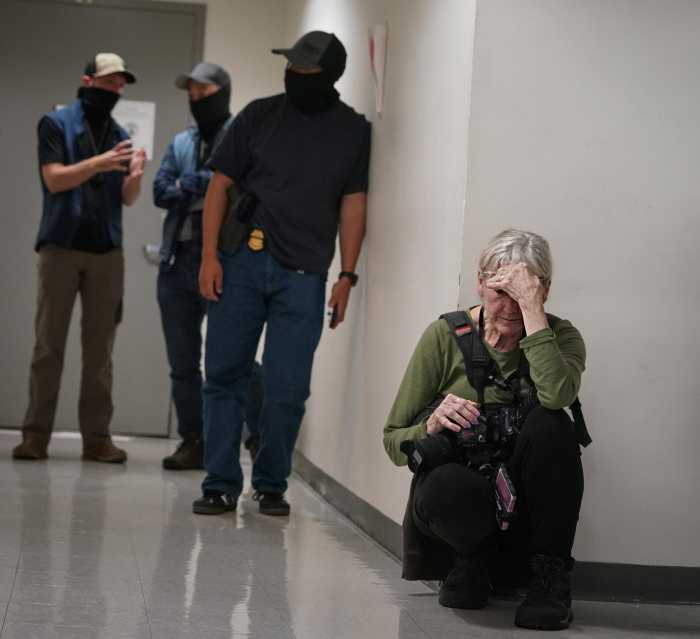“Fiddler on the Roof” lyricist Sheldon Harnick will host a 50th anniversary celebration of the show this weekend at the 92nd Street Y. | HENRY GROSSMAN
BY DAVID NOH | The 92nd Street Y is observing a very special theatrical anniversary with a special concert series, “To Life! 50 Years of ‘Fiddler on the Roof.’” A cast headed by Jonathan Hadary will be singing those immortal songs, with Rob Fisher as music director, but, best of all, the show’s lyricist, Sheldon Harnick, will be hosting with his matchless erudition, wit, and brio. (May 30-June 1, Lexington Ave. at 92nd Street; 92y.org/Event/L-L-Fiddler-on-the-Roof)
In his lovely, light-filled apartment in the Beresford on Central Park West, Harnick brought up another 50th anniversary he is celebrating this year, his marriage to photographer wife Margery. Asked which he thinks is the more impressive milestone, he immediately says, “Marriage. But what’s astonishing to me is not the length of the show’s popularity, but the attention that’s being paid to it. Others have lasted as long, but they don’t make such a fuss about it.
“I have a friend who runs the Utah Festival Opera and last year, they did ‘Fiddler,’ and he played Tevye. I coached him because too many of his readings were operatic. He thanked me and said, ‘Because of what you wrote, there’ll never be anti-Semitism again.’ I thought, ‘From your mouth to God’s ear, but it’s rising in Europe for some reason. There were few shows back in 1965 with such a heavily Jewish theme, apart from ‘Milk and Honey’ and a couple of others, but not this serious.
Sheldon Harnick’s total recall; Simon Callow’s sensible heels
“In our pre-Broadway try-out in Detroit, during intermission I had two diametrically opposed experiences. I was in the men’s room and heard these two very wealthy corporate looking types talking. One said, ‘If I knew it was about Jews, I wouldn’t have come.’ Then I went out and overheard a woman in the phone booth saying, ‘Harry, I told you should have been here! There was a pogrom and everything!’
“When we talked about casting Tevye, [composer] Jerry Bock and I wanted Howard Da Silva, who’d been ‘Fiorello.’ Jerome Robbins, our director, said, ‘I know Howard’s work is wonderful but Howard is life-sized and I want someone who’s larger than life and that’s Zero Mostel.’”
With brilliant, irresistibly hammy Mostel, it was a different show every night. To Harnick’s knowledge, he never changed dialogue but would change the staging so other actors never knew where he would be.
“During ‘If I Were a Rich Man,’ all Zero had to do was raise his can of milk to heaven and sigh, and then lower his arm accidentally into the milk. He then was supposed to wring out his sleeve and look at God, as if to say, ‘This too, you do to me?’ Zero took that wet sleeve and made perfume for behind his ears, greased the wheels of his wagon with it, and walked to the edge of the stage and wrung his sleeve into the orchestra pit and it went into a bassoon. That’s a $15,000 instrument and the musician was ready to kill him. [Producer] Hal Prince saw this and said, ‘I’m replacing him at the end of his contract even though the show is a success, because there’s no telling what he’ll do for a laugh.’
“What really broke Mostel’s heart, however, was being passed over for the 1972 film adaptation. [Director] Norman Jewison said, ‘The only person I’ve ever seen who can use Zero effectively is Mel Brooks [in ‘The Producers’]. He’s too big for the screen.’”
Harnick loves the film, which never really seems to quite get the recognition for the great movie musical that it is.
“The first time I saw it I was very conscious that a lot of the verbal humor got lost because for [the film Tevye] Topol, English was his third language. But the second time I saw it, it didn’t matter at all. Oh my God, what he and Jewison had done was wonderful, they made a real movie out of it.”
The last Broadway revival of “Fiddler” had many detractors, and Harnick is one of them.
“There was a lot wrong with it, and part of it was our fault. Bock, [book writer Joseph] Stein, and I were we were so hungry to see a new look because we were so used to the little house on stage and we had seen Sam Mendes’ brilliant reimagining of ‘Cabaret.’ So when [director] David Leveaux got this set designer who showed us this open stage, we thought, ‘That’s wonderful!’
“But once the show opened, I realized the audience was confused. Here is this poor man who really should live in a tiny house and it looked like an estate with trees in the background. The opening number went great and then we lost the audience for 15 minutes before finally they’re brought back into it the story, because of the staging.
“And at some rehearsals, I saw Alfred Molina attempt to do things that were wonderfully emotional, and Leveaux kept pulling him back. I thought, ‘My God, he’s taking an aristocratic approach to this, not letting him do what is called for. So Molina was criticized for his acting, which wasn’t his fault.
“When Harvey Fierstein came in, Leveaux didn’t bother to direct him and just let him do what he wanted. Consequently, Harvey’s second act was one of the most emotional I have ever seen, just brilliant — so I did not enjoy working with Leveaux. Rosie O’Donnell as his wife was odd casting, but I understood why they wanted her, a name. I fell in love with her because she was so dedicated and worked so hard. She told me told she felt so privileged and honored to be playing this role. She didn’t kid around at all and she gave it the best she could.”
My personal favorite musical is Harnick’s “She Loves Me,” which the Roundabout is happily reviving with Laura Benanti and Josh Radnor in the spring of 2016 (roundabouttheatre.org).
“I’m very curious because the last time Scott Ellis directed it, it was lovely, but in the meantime his skills have improved! I just wrote him a note thanking him for ‘You Can’t Take It with You,’ ‘The Elephant Man,’ and ‘On the Twentieth Century,’ which he did this year, and I’m dying to see what he does with it!”
Of all the great lyricists, I don’t think there is a more character-driven one than Harnick.
It’s only way I know how to write and do it very consciously. I study the script and try and get a bead on these characters, put myself in the situation, what would I say? Shows with villains are hard for me to do. I turned down the musical ‘Nick and Nora.’ I was there when the producer asked the director Arthur Laurents, ‘In a sentence, what’s this show about?’ Arthur said, ‘It’s about Nick and Nora Charles, these two innocents dancing their way through an evil world.’
“I thought about it and called him, ‘Arthur, I can’t do the show. I can do the songs for innocence, but I just can’t for an evil world.’ And am I glad I got out of it: it was a disaster.”
Part of the wonder of Harnick is his irrepressible enthusiasm for the better, younger perpetrators of the art at which he so excels.
“I loved ‘Hamilton!’ We saw it twice, but the first time, Lin-Manuel Miranda, who’s a friend, wasn’t in it. As we walked up the aisle, he popped out of the audience and said, ‘I had to see the show!’ He told us whom to call, and we got house tickets for another performance and we will see it again on Broadway. He was very smart: the producer wanted to go right to Broadway, but Lin realized it was too long and when we saw it the second time we realized the second act needed to be trimmed. As far as I know, that’s what he did.
“I was surprised that everyone seems to love it except for [orchestrator] Jonathan Tunick and his wife, they didn’t buy it. I’m very curious to see what Sondheim thinks of it. I went to see ‘Bloody Bloody Andrew Jackson’ and I hated it. I walked out at intermission with [playwright] David Ives who said, ‘I’m going to send Sondheim a bill for my time. He’s the one who told me to see this!’”
Harnick is an utterly inspirational 91, mind and body vibrantly alive, and I constantly see him around town catching performances. When I asked him what his eternal youth secret is, he chuckled, “Oh, I don’t know, I’m just happy I’m working. My sister is going to be 93, and the only thing she needs is a cane. My Dad died at 69 and my mother was 75. I feel she could have lived much longer, but was lonely for him and just ate and ate.
“Joe Stein was my inspiration. He was close to 98 and going strong. He was in the hospital and had to go to the men’s room but was too embarrassed to ask the nurse to come in with him. He had his walker and told her, ‘You stay out here,’ but he lost control of the walker, fell, and fractured his skull. But he was great, right up to the end!”
SImon Callow. | COURTESY: KAREN GRECO
The eminent British character actor and author Simon Callow is appearing in a daring, critically lauded one-man, or I should say one-woman, show at 59E59, “Tuesdays at Tesco’s.” His Pauline is a burly cross-dresser, who nevertheless believes herself the most glamorous of domestic divas, caring as she does for her violently disapproving curmudgeon of an old father, whom she takes once a week to the titular English supermarket chain for his groceries.
The play is a real tour-de-force for the actor. who ruthlessly throws himself into this challenging, self-enchanted role. (59 East 59th Street, through June 7; 59e59.org)
If you are wondering, this is not Callow’s first time at the drag rodeo.
“In 1975, I played Princess Anne in a short parody of ‘Equus,’” he told me, “in which her horse broke his leg and she had to shoot it, and a few years later I played Margaret Thatcher in ‘A Mad World My Masters,’ by Barrie Keeffe.”
It takes Callow an hour to become Pauline: “The wig, makeup, dress. It’s quite easy to wear all of that, but it changes your whole posture. Once you have all that on, you cannot behave like a man. I was brought up completely by women, and I watched them assemble themselves and that is exactly what I do every night. The shoes are quite comfortable, except when we did this in Edinburgh four years ago, they were black. For New York, however, I said Pauline demands turquoise, so the costumer painted them, which says a lot about our low budget.”
A friend of Callow’s had seen the original production of the play in Paris and sent the script to him, thinking it would be a great role for him.
“I didn’t have time to read it, and didn’t particularly want to do another one-person show. I had looked at a couple of Charles Ludlam plays, but realized they probably relied on him. So I read the play in French and within a page knew I wanted to do it. We’ve translated it and made it English so the French Monoprix store has become our British Tesco’s. [Playwright] Emmanuel Darley got the idea for it when, in a supermarket, he saw a trans woman and her father having a fight, and out of that stemmed the whole vision of what their lives might have been.”
Callow has been comfortably out and gay for most of his life: “It was only an issue when I started getting a little bit famous and everybody said, ‘Don’t come out!’ Interviewers would ask if I had a girlfriend, and I would say, ‘No, I haven’t got a boyfriend either. I’m gay.’ But they thought I needed to be protected and never printed that. Also, they didn’t want me to tell them, they always want to find you out.
Simon Callow appears in the one-man show “Tuesdays at Tescoe’s” at 59E59 through June 7. | CAROL ROSEGG
“I knew I was gay from an early age, seven or eight. I never had the hots for girls, only boys. But when I was 12, I was reading books about homosexuals and what a dreadful life was presented to me! I seemed to be the only gay person, and all there was was getting picked up by a couple of rather seedy people in dirty mackintoshes.
“Even when I got my first job in the theater at the Old Vic box office, I was too shy. But then I went to drama school and that was fantastic. I never had any anxiety, shame, or guilt, so I eventually had to stop people from protecting me. It was actually a useful thing to do, as I think I’m the first well-known British actor to come out. There were others, but mostly in fringe theater, and I think I led the way for people like Antony Sher and Ian McKellen.”
Callow is happily partnered with Sebastian Fox, who is “32, dazzlingly handsome, a management consultant. He just went home today. We’ve been happy together for three years now and are getting married.”
Apart from acting and directing, Callow writes constantly.
“My third volume of my Orson Welles biography came out, which ends on a note of triumph with his film ‘Chimes at Midnight,’ which I think is his greatest film. Now I have to write the fourth and final volume, also a book about Wagner based on this one-man show I did, ‘Inside Wagner’s Head.’ Then I want to write a novel, but haven’t been able to get around to it. You have to be completely ruthless. I do quite a bit of journalism, too, so am always with deadlines. You have to compartmentalize everything. I’m very greedy!”
In 1999, Callow was made a Commander of the British Empire: “It’s quite touching because it was given for services rendered to the theater. Yet I’m a commander of an empire that doesn’t exist anymore, very ‘Alice in Wonderland.’ I like that absurdity, but it is lovely and the queen was charming when she gave it to me.”
Contact David Noh at Inthenoh@aol.com, follow him on Twitter @in_the_noh, and check out his blog at http://nohway.wordpress.com.

